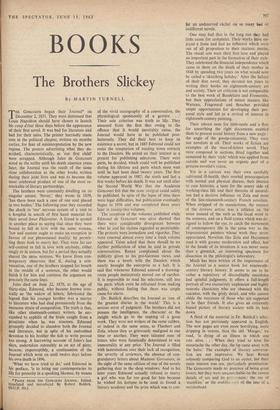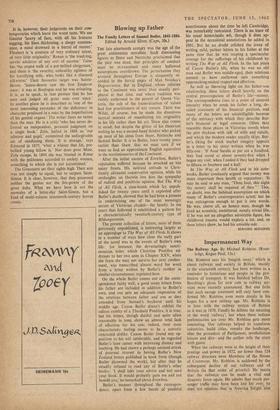BOOKS
The Brothers Slickey
By MARTIN TURNELL
ITE Goncourts began their Journal* on
M
December 2, 1851. They were distressed that Louis Napoldon should have chosen to launch his coup d'etat three days before the appearance of their first novel. It was bad for literature and bad for their sales. The printer hurriedly made cuts in the political chapter, written six months earlier, for fear of misinterpretation by the new regime. The posters advertising what they de- scribed, characteristically, as 'our first child' were scrapped. Although Jules de Goncourt acted as the scribe until his death nineteen years later, the Journal was the result of the same close collaboration as the other books written during their joint lives and was to become the most celebrated product of one of the most re- markable of literary partnerships.
The brothers were constantly dwelling on its singular nature. 'Never,' they wrote in 1859, 'has there been such a case of one soul placed in two bodies.' The following year they recorded the shock to 'our' nervous system of a visit to a hospital in search of first hand material for their novel Sceur.Philomene. A friend is quoted in another place as saying that since they were bound to fall in love with the same woman, 'law and custom ought to make an exception in favour of our phenomenal duality' by permit- ting them both to marry her. They were far too self-centred to fall in love with anybody, either singly or in unison, but for a period they actually shared the same mistress. We know from con- temporary observers that if, during a con- versation, one of the, brothers stopped for breath in the middle of a sentence, the other would finish it for him and continue the argument on precisely the same lines.
Jules died on June 22, 1870, at the age of thirty-nine. Edmond, who became known iron- ically as 'the widow of letters,' fabricated the legend that his younger brother was a martyr to literature who had died prematurely from the immense strain of composition. The truth is that, like other nineteenth-century writers, he suc- cumbed to syphilis of the brain caught from a prostitute when he was nineteen. Edmond promptly decided to abandon both the Journal and literature, but in spite of his undoubted devotion to his brother the itch to write proved too strong. A harrowing account of Jules's last days, undertaken ostensibly as an act of piety, became, imperceptibly, a continuation of the Journal which went on until twelve days before his own death in 1896.
'What we have tried to do,' said Edmond in his preface, 'is to bring our contemporaries to life for posterity in a speaking likeness, by means
PAGES FROM THE GONCOURT JOURNAL. Edited, translated and introduced by Robert Baldick. (0.U.P. 38s.) of the vivid stenography of a conversation, the physiological spontaneity of a gesture. . . Their sole criterion was truth to life. They assumed from the first that owing to the offence that it would inevitably cause, the Journal would have to be published post- humously. They did their best to keep its existence a secret, but in 1883 Edmond could hot resist the temptation of reading some extracts to the Daudets. He seized on their interest as a pretext for publishing selections. There were parts, he decided, which could well be published during his lifetime and parts which must wait until he had been dead twenty years. The first volume appeared in 1887; the ninth and last a few weeks before his death. It was not until after the Second World War that the Acaddmie Goncourt felt that the texte integral could safely be published. In spite of the lapse of time there were legal difficulties, but publication eventually began in 1956 and was completed three years later in twenty-two volumes.
The reception of the volumes published while Edmond de Goncourt was alive showed that there were considerable divergences between what he and his victims regarded as permissible. The protests were immediate and vigorctus. They were renewed almost every time a fresh volume appeared. Taine asked that there shoulll be no further publication of what he said in private conversations. Renan complained about the publicity given to his pro-German views, and there was a brush with the Daudets which nearly brought the enterprise to a halt. It is said that whenever Edmond entered a drawing- room people instinctively moved out of earshot. It is impossible to read his selections, still less the parts which even he refrained from, making public, without feeling that there was ample cause for alarm.
Dr. Baldick describes the Journal as 'one of the greatest diaries in the world.' This is a serious error of judgment. The brothers did not possess the intelligence, the character or the insight which go to the making of a great work. They were not writers of the same calibre, or indeed in the same sense, as Flaubert and Zola, whom they so grievously maligned at one time or another. They were talented men of letters who were fanatically determined to win immortality at any price. The Journal is filled with lamentations over their lack of recognition, the severity of reviewers, the absence of con- gratulatory letters about Madame Gervaisais, or the sight of the same edition of one of the novels gathering dust in the shop windows. And in his later years Edmond actually refused to marry a girl who was far too good for him because he wished his fortune to be used to found a literary academy and the prize which was to con- fer an undeserved cachet on so many bad or indifferent novels.
One may feel that in the long run they had little cause for complaint. Their works have en- joyed a fame and had an influence which were out of all proportion to their intrinsic merits. The visual arts were their first love and played an important part in the formation of their style. They celebrated the financial independence which came to them on the death of their mother in 1848 by spending two years on what would now be called a 'sketching holiday.' After the failure of their first novel, they devoted ten years to writing their books on eighteenth-century art and society. Their art criticism is not comparable to the best work of Baudelaire and Fromentin, but their appreCiations of minor masters like Watteau, Fragonard and Boucher provided ample opportunities for developing their per- sonal style and led to a revival of interest in eighteenth-century painting.
Their inborn taste for tittle-tattle and a flair for unearthing the right documents enabled them to present social history from a new angle : the angle of the gossip-columnist. They were not novelists at all. Their works of fiction are examples of the man-of-letters novel. They were composed in sections, fitted together and cemented by their 'style' which was applied from outside and was never an organic part of a genuine novelist's vision.
Yet in a curious way their own carefully cultivated ill-health, their morbid preoccupation with mental and physical disease, their interest in case histories, a taste for the seamy side of working-class life and their theories of natural- ism had a decisive influence on Zola and most of the late-nineteenth-century French novelists. When stripped of its mannerisms, the essence of the ecriture artiste was a reliance on the noun instead of the verb as the focal word in the sentence, and on a fluid syntax which was de- signed to follow the eye, to catch the movement of contemporary life in the same way as the Impressionist painters whose work they never appreciated. Novelists like Zola and Huysmans used it with greater moderation and effect, but in the hands of its inventors it was never more than a gimmick, an interesting specimen for dissection in the philologist's laboratory.
Much has been written of the importance of the Journal as a source book for nineteenth- century literary history. It seems to me to be rather a repository of discreditable anecdotes and spiteful judgments. It offers a full-length portrait of two excessively unpleasant and highly neurotic characters who are obsessed with the macabre, with the grisly detail, and who cannot abide the successes of those who are supposed to be their friends. It also gives an extremely biased picture of literary society with its hair down.
A third of the material in Dr. Baldick's selec- tion has not previously appeared in. English. The new pages are even more horrifying, more dripping in venom, than the old. 'Murger,' we read, 'is dying of an illness in which one rots alive. . . When they tried to trim his moustache the other day, the lip came away with the hairs.' The examples of literary conversa- tion are not impressive. We hear Renan solemnly comparing God to an oyster, but their main interest was sex, particularly prostitution. The Goncourts made no pretence of being great lovers, but they were unquenchable on the rawest details of sex and its Nn orsions: the use of 'manikins' or the audible ,d1 n of the loss of a maidenhead. It is, however, their judgments on their con- temporaries which leave the worst taste. We see Gautier 'heavy of face, with all his features sagging, his lines thickening, a sleepy counten- ance, a mind drowned in a barrel of matter.' Flaubert is 'a creature of very ordinary talent, of very little originality.' Renan is 'the toadying, servile adulator of any sort of success.' Taine has 'the stupid walk of a pot-bellied clergyman,' and there is 'the swarthy, unhealthy ugliness of his horrifying wife, who looks like a diseased silkworm.' Their favourite target was Sainte- Beuve. `Sainte-Beuve saw the first Emperor once: it was at Boulogne and he was urinating. It is, so to speak, in that posture that he has seen and judged all great men ever since.' In another place he is described as 'one of the most interesting examples of the deficiency in character produced in a man by the imperfection of his genital organs.' The writer fares no better than the man. He is a critic 'who has never de- livered an independent, personal judgment on a single book.' Zola, hailed in 1868 as 'our admirer and pupil,' committed the unforgivable sin of outshining them. 'It is strange,' says Edmond in 1875, 'what a whiner that fat, pot- bellied young fellow is.' Nor does poor Mme. Zola escape. In 1894 she was 'treated in Rome with the politeness accorded to society women, something to which she is not accustomed.'
The Goncourts set their sights high. Their aim was not simply to equal, but to surpass Saint- Simon. It is clear, however, that they possessed neither the genius nor the fire-power of the great duke. What we have here is not the memoirs of a latter-day Saint-Simon, but a kind of multi-volume nineteenth-century horror comic.



































 Previous page
Previous page